|
|
|
Sort Order |
|
|
|
Items / Page
|
|
|
|
|
|
|
| Srl | Item |
| 1 |
ID:
139883
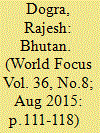

|
|
|
|
|
| Summary/Abstract |
Bhutan is a landlocked country sandwiched between India and the Tibet region of China in the eastern Himalayas. It covers an area of 46,500 sq. Kms, Roughly 150 km North to South and 300 km East to West. The kingdom is bordered by the Tibet region of China and the Indian states of Sikkim, West Bengal, Assam and Arunachal Pradesh. Geographically, Bhutan can be divided into four environmental zones: the Great Himalaya, the Inner Himalaya, the Outermost ranges and the Duars Plain.
|
|
|
|
|
|
|
|
|
|
|
|
|
|
|
|
| 2 |
ID:
140614
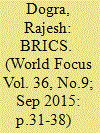

|
|
|
|
|
| Summary/Abstract |
The importance of Brazil, Russia, India, China, and, to some extent, South Africa, within the global governance structure has increased. This rise of importance is derived from the enhancement of the economic capabilities of these powers and the fact that economic interdependence has rendered the world more sensitive to the economic policies of these nations. The global financial crisis, with its detrimental effects on the global economy, was the starting point of a transformation of the global governance landscape. This fluid political and economic global environment seems to be leading to the enhancement of the position of regional powers, especially within the developing world. The more significant fact is that these emerging powers have initiated a process of conducting regular meetings for the purpose of discussing and coordinating their actions related to global issues.
|
|
|
|
|
|
|
|
|
|
|
|
|
|
|
|
| 3 |
ID:
141244
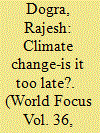

|
|
|
|
|
| Summary/Abstract |
The exact amount of climate change that is caused by human activities is not clear. However, it is clear that increasing greenhouse gas emissions result in warmer global temperatures and those human activities produce greenhouse gases. While climate change may not be caused by human activities alone, it is very likely that the changes observed during the last 50 years are not simply the result of natural causes. Is it too late to become part of the solution? No. We already have the knowledge and tools to start making changes.
|
|
|
|
|
|
|
|
|
|
|
|
|
|
|
|
| 4 |
ID:
142125
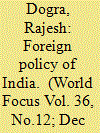

|
|
|
|
|
| Summary/Abstract |
A grand external strategy would require that interactions between different strategic objectives be examined to arrive at the right balance. There is clearly a possibility of a trade off between some interactive objectives, and even between components of an objective. Despite the heightened expectation of the global community, the implications of India’s enhanced role in global issues and governance needs to be looked at within the parameters of its growth and security objectives. In case of contradictions, the former should be given lower priority in the conduct of the country’s foreign policy. This does not, in any sense, imply an abdication of global responsibilities, but rather that India cannot afford to let them pose a trade-off on the more important aspects of its national security. Today standing on the crossroads of global highways of the international politics and relations, it is India’s moment of millennial opportunity. The challenge is to convert the national hope into reality. To make a great leap in congruence to our collective Vision of 2020, an intellectual foreign policy is the only panacea for all evils.
|
|
|
|
|
|
|
|
|
|
|
|
|
|
|
|
| 5 |
ID:
145360
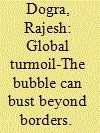

|
|
|
|
|
| Summary/Abstract |
The terrorist power grows in arithmetical progression where as the state power in the age of science and technology can grow in geometrical progression. One fact has is very clear that both the power of state and terrorist has increased. Ultimately, problem of terrorism cannot be solved by violent means. Good ends can be achieved only through good means. Violence leads to counter-violence and anti-humanity. States have to bring down terrorism by applying multi-level approach including changing the behaviour of terrorist through non-violent means.
|
|
|
|
|
|
|
|
|
|
|
|
|
|
|
|
| 6 |
ID:
144003
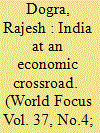

|
|
|
|
|
| Summary/Abstract |
At the end we can conclude that although prosperity is not a sufficient condition for peace, it is unquestionably a factor that can help in achieving peace and in its maintenance. It is seldom prosperity in itself that reduces tensions, but rather the absence of extreme differences in levels of prosperity. In many cases, trade, as one of the main economic diplomacy tools, can play a facilitating role in fostering sustainable development and peace. Therefore, it is imperative that the international community work to make trade and globalization contribute to successful development. To this end, accelerated economic growth and increased returns from trade should be channelized into achieving human and social development including food security, energy security, rural development, and universal access to essential services, gender equity, and poverty reduction.
|
|
|
|
|
|
|
|
|
|
|
|
|
|
|
|
| 7 |
ID:
143040
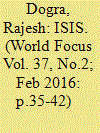

|
|
|
|
|
| Summary/Abstract |
The actions of ISIS in the past few years have left the whole international community to stare feared with awe. The pace with which ISIS is expanding and the number of victims that leaves behind, has caused severe alert to all international organizations and States. The problems of the funding of ISIS, the support from other terrorist groups, the internet propaganda and the foreign terrorist fighters are phenomena that are still hard to be 100% traced and solved.
|
|
|
|
|
|
|
|
|
|
|
|
|
|
|
|
| 8 |
ID:
142720
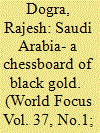

|
|
|
|
|
| Summary/Abstract |
Oil and natural gas are parts of fossil fuels and scientists believe that they were formed by organisms-animals and plants-that died, decomposed, and converted into solid rock thousands, may be millions, of years ago as a result of eminent level of heating. That natural process took place under the earth and resulted in what is today called petroleum, a finite mixture of hydrocarbon molecules that is not easily expendable. Oil and natural gas have high net energy and outside the fact that one is a fluid and other is vaporous at surface condition, their only difference relates to the level of the heating the rocks persisted and their molecular weight.
|
|
|
|
|
|
|
|
|
|
|
|
|
|
|
|
| 9 |
ID:
138383
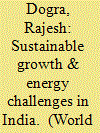

|
|
|
|
|
| Summary/Abstract |
It relies on significant amounts of energy from foreign sources and, as such, India is a price taker, not a price setter. India can reduce its vulnerability to energy price fluctuation through a flexible and competent energy market, but it cannot isolate itself from price volatility. At the same time, to expand its energy supply capacity to meet the rapidly growing energy demand of its people, India needs more investment. A significant portion of the required investment must come from foreign investors, for whom it competes with other countries. This implies the necessity of integrating India’s energy institutions and policies with global practices.
|
|
|
|
|
|
|
|
|
|
|
|
|
|
|
|
|
|
|
|
|